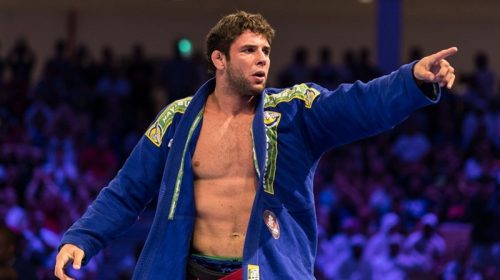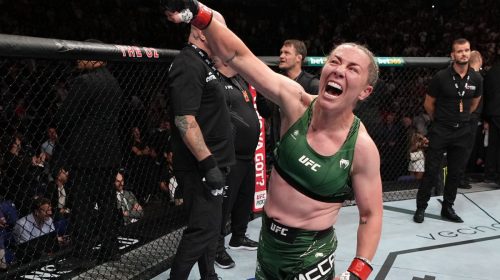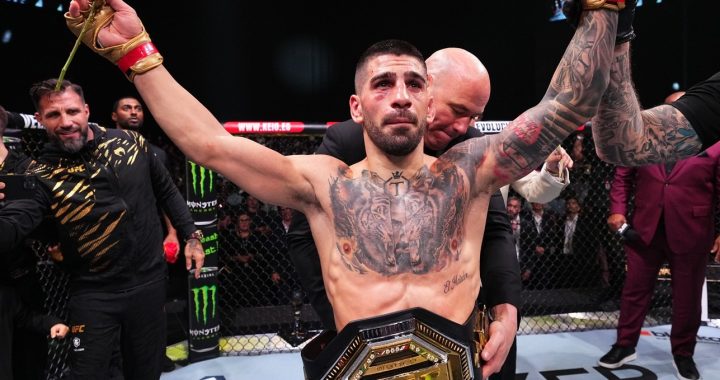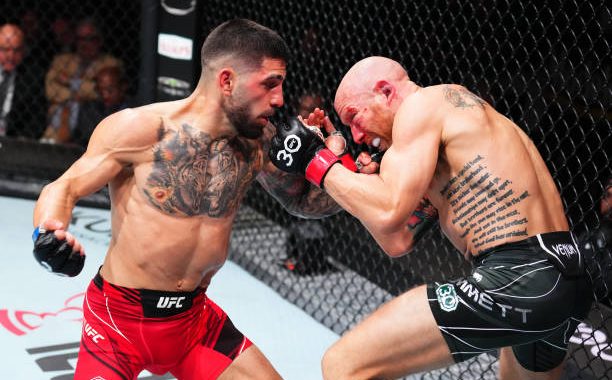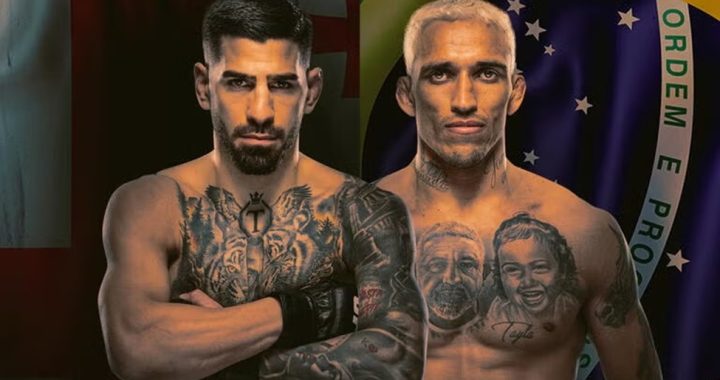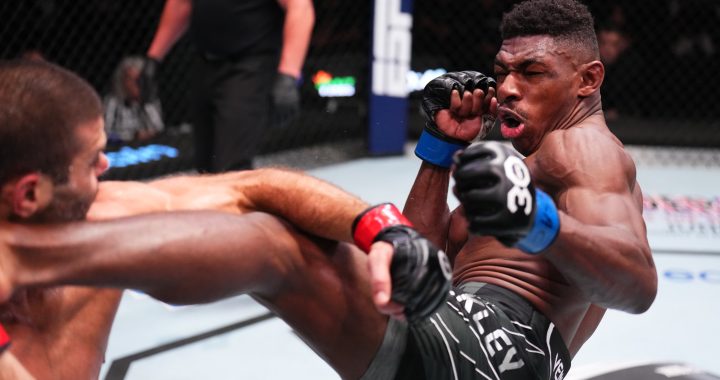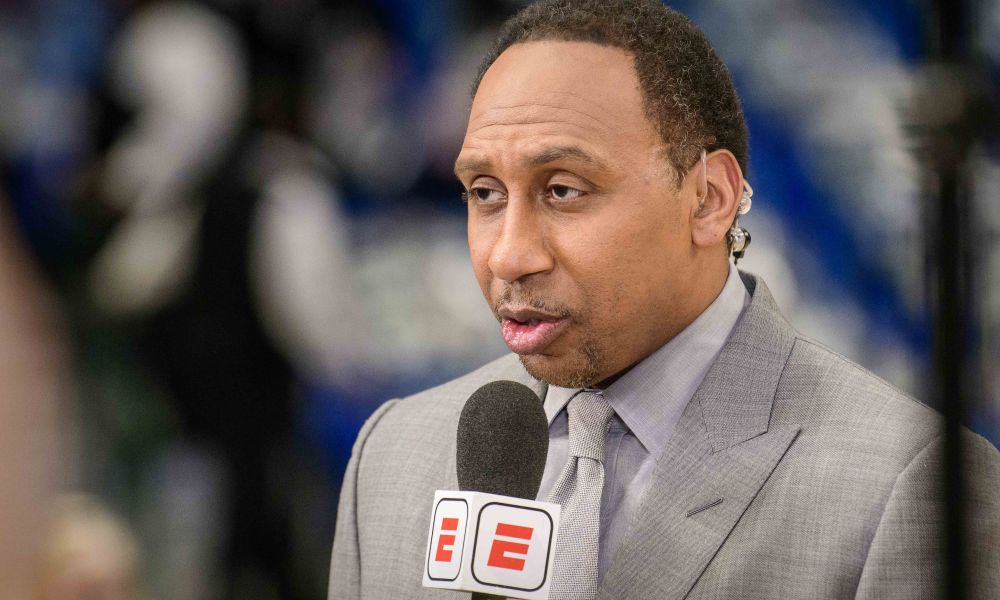
Jan 8, 2020; Dallas, Texas, USA; ESPN sports television personality Stephen A. Smith speaks before the game between the Dallas Mavericks and the Denver Nuggets at the American Airlines Center. Mandatory Credit: Jerome Miron-USA TODAY Sports
The life and times of Stephen A. Smith: Volume 2
I thought I was done with this argument when Donald “Cowboy” Cerrone told ESPN’s Brett Okamoto that he, “didn’t want to be there” against Conor McGregor.
Stephen A. Smith was right, in so many words. He may not have been cordial enough for the UFC sycophants, but his analysis was correct. Since this argument has been reiterated, the new points made now surround the semantics of Smith’s points. Luke Thomas even admitted the symmetry between Smith’s comments and Cerrone’s statements. Of course he had to qualify this in an attempt to discredit Smith.
“Here is the problem with Smith’s argument: At a surface level there is some symmetry there,” Thomas stated.
“Cowboy is lending a little bit of credence to what Smith said in just terms of not being dialed in when he needed to be and probably could’ve taken more. But, one, it looked like he [Cerrone] laid down to him [Smith], there’s virtually no evidence for that. Number two, when you actually look at the tactical choices he made none of them were exactly bad and it removes the agency from Conor McGregor … And third, Cobb, here is what I think is really being lost: he said that on that night and repeated it over-and-over-and-over again. Namely that he’s never had a pay-per-view before. Right? You have consistently made a factual error about this,” he argued.
While it appears that Thomas is trying to be neutral in this discussion, his own words dictate a clear opposition to Smith. That is fine, he is just wrong. But he invalidates Smith’s entire argument based on one subpoint. The only truly wrong point Smith made was based on PPV experience. And, again, his ultimate problem is – how Smith said it. So in the future, make the same points, but be sure to be nice about it.
Let me make one point unequivocally clear: I have the advantage of listening to everyone’s criticism before I chime in.
I want to grasp the story fully before I roll up my sleeves. That isn’t to say that I’m riding the fence waiting for a side I can attach to. I always agreed with Smith. My frustration with the feedback was always related to the argument that Cerrone, and UFC fighters in general, deserve a higher level of respect because of the nature of their sport. More specifically, that this sport is different than any other professional sport.
For days we have listened to MMA writers and fighters agree that Smith has no idea what it is like to be in a cage fighting an opponent. The same could be said of the vast majority of MMA writers from every MMA media. When Ben Rothwell joined MMA Fighting, he said that to three journalists. MMA Fighting has some of the best MMA reporters in the sport. Not one of them spoke up stating they are in the same boat.
“Your first set of comments were an attack,” Rothwell said of Smith.
“And it wasn’t any kind of a forgiveness … No you called him a quitter. And he was saying things that … like a lot of fighters took offense to. You don’t know fighting. And you don’t know what its like to be in that cage. So don’t act like you know what its like to be in that cage. You don’t. Until you get in the cage and you understand what that real true pressure is like, having someone across from you that’s trying to end you, in front of millions of people, it’s not like any sport in this entire planet. You have no idea so stop trying to pretend like you know. You don’t,” he finished.
I am blown away that this notion did not offend any of these journalists. Now we compound the argument. Smith wasn’t nice about Cerrone –and he has never been in an MMA fight. This should offend all journalists.
So I’ll say it: I’ve never been an MMA fighter before. Does that mean that I don’t have the experience or background to accurately report on this sport?
The answer is an overwhelming no. I also didn’t need to face Mariano Rivera’s cut fastball to know he is the most dominate closer in the history of baseball. But I can also equally say that he, by definition, blew Game 7 of the 2001 World Series. A good performance and a bad performance should be reported with equal tenacity. And this is the quintessential argument that should offend every journalist, MMA or otherwise.
So aside from being correct in Smith’s post fight analysis, we have come to the tone of his words. What have we learned from the whole debacle? If you are going to report on someone’s athletic performance, you better have firsthand experience of that sport. And don’t forget that these athletes are also people. So you can be right, just be nice. Well if that is the kind of reporting you want, go subscribe to The Players’ Tribune. But I’d rather have real reporting and real analysis, niceties be damned. That is exactly what Stephen A. Smith gave us, and he was right.






